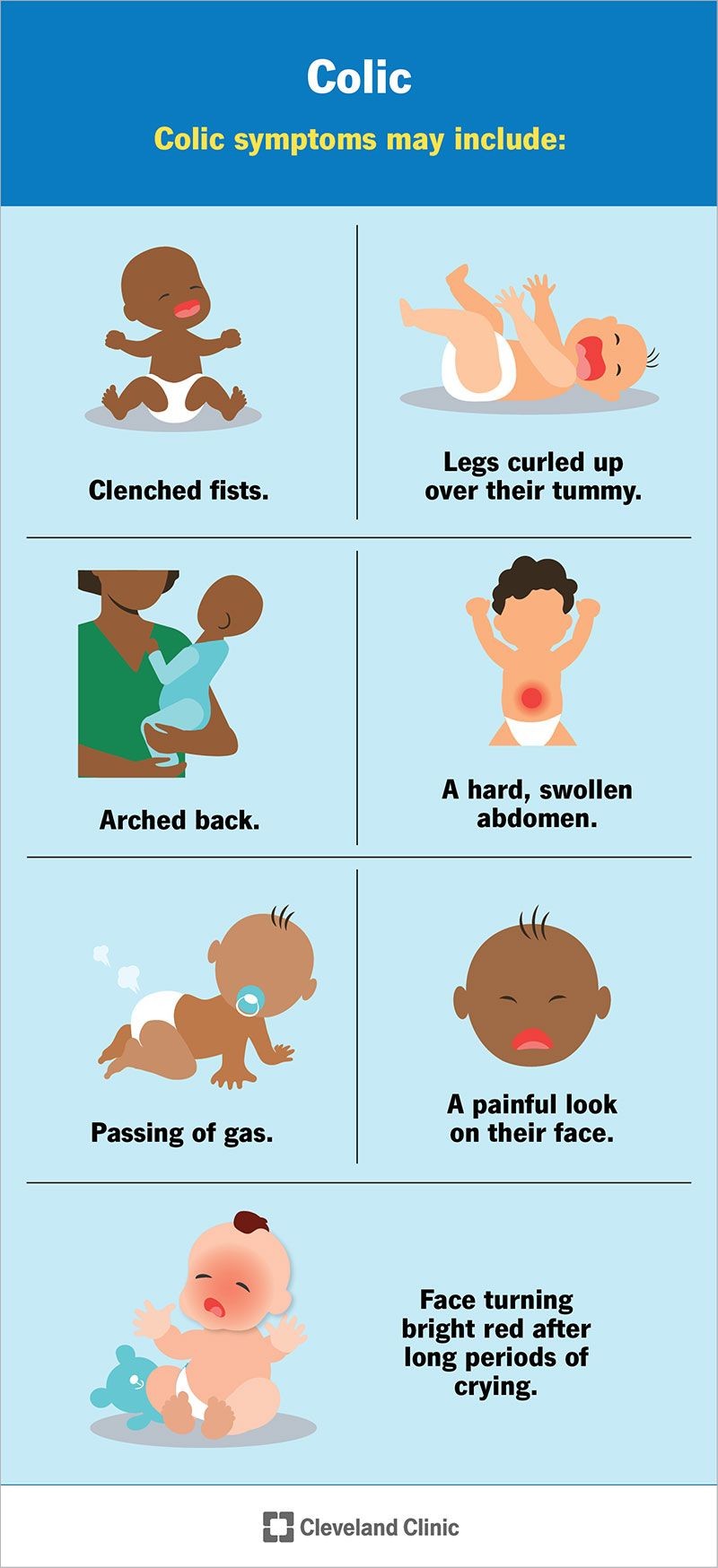
Contents
- 1 Colic in Babies
Colic in Babies
Cradle a colicky baby face-down with your hand under her belly and her head on your forearm. The pressure on her tummy can relieve uncomfortable gas. Source: Cristian Baitg / Photographer’s Choice
For many parents, there is nothing more stressful than listening to an inconsolably crying newborn. Colic leads to long stretches of crying, difficult for parents, friends, and family dealing with a new baby at home.
Things to know about colic in babies
- Colic is self-limited and episodic.
- Colic affects 5%-40% of infants worldwide and accounts for 10%-20% of health care provider visits during the early weeks of an infant’s life.
- Overfeeding, undiluted juices, food allergies, and emotional stress can aggravate colic.
- A doctor should evaluate a baby with new abdominal pain and crying to exclude other more serious conditions.
- Don’t give medications or other treatments to an infant unless approved by the child’s medical practitioner.
What is colic? What causes colic in babies?
Infantile colic is recognized by physicians and is defined as "one who, otherwise healthy and well-fed, had paroxysms of irritability, fussing, or crying without an obvious cause lasting for a total of three hours a day and occurring on more than three days in any one week for a period of three weeks." Colic duration is now "one or more weeks." Not all fussy babies suffer from colic. Most infants cry two to three hours per day, but the crying spreads out during the 24-hour period.
What are colic symptoms and signs in babies?
The crying or fussing frequently begins suddenly after a feeding. The cry is loud, high pitched, and continuous, and the spells last from one to four hours. The baby’s face gets flushed or red. The belly is distended or prominent, the legs alternating between flexed and extended straight out; the feet are cold and the hands clenched. The episodes occur at any time of the day or night, typically in the late afternoon or early evening. Some babies are more prone to colic. Infantile colic begins at about 2-3 weeks of age, reaches its peak at 2 months, begins to subside by 3 months, and is gone by 3½ to 4 months of age. Many babies experience colic, and much research has been done; however, there is no one proven cause. Some studies found no discernible cause for one-quarter of those babies who suffered from colicky episodes, frustrating parents.
Factors that may worsen colic symptoms:
- Overfeeding
- Feeding certain foods with high sugar content
- Excessive anger, anxiety, fear, or excitement in the household
- Other unknown factors
QUESTION
What remedies can help babies with colic?
This is a very common problem (up to 40% of babies suffer from colic). Discuss any concerns with the child’s pediatrician and talk to other parents or relatives with similar experiences. Colic generally occurs in big, healthy, active, vigorous babies who are great eaters and who grow well. Sickly, poor-feeding, unhealthy babies or babies with significant underlying problems may be cranky, miserable, and unhappy most of the time, unlike babies with colic who have episodes at a set time of the day.
Suggestions:
- Do not overfeed.
- Breastfeeding mothers should avoid excessive milk products, caffeine, onions, cabbage, beans, broccoli, and other gas-producing foods. Dilute juices or offer plain water.
- Avoid juices (young infants should not be drinking juice).
- In formula-fed baby, try changing to a formula containing whey hydrolysate or try a low-allergy formula. These changes can decrease episodes and duration of symptoms in some infants.
- Consider the use of a pacifier.
- Try infant massage, a warm bath, or a warm washcloth on the tummy.
- Take a break! Try to have someone else watch the baby, even for an hour, and leave the house.
- Try walking the baby in a front-pouch-style carrier with legs drawn up and pressure on the belly.
- Physical stimulation like rocking gently or using "white noise" sounds soothe some babies.
- Swaddle the baby firmly in a comfortable blanket.
- Medications and other homeopathic treatments have not proven to be more effective than placebo and should be avoided unless prescribed by a medical provider.
- Be cautious with herbal remedies. Try to avoid using gripe water.
- Probiotics may be helpful for some infants. Discuss these options with a health care professional.
What can the doctor do to help a colicky baby? What is the treatment for colic in an infant?
Consult the baby’s doctor at the very beginning of suspected colic symptoms. Exclude other causes of crying or sudden-onset screaming in a newborn. Remember that other less serious causes of crying include discomfort. If the infant is hungry, too cold or warm, over-tired, or suffering from food intolerance, these may also cause crying. Check for intestinal blockage or obstruction, abdominal infection, hernia, a scratch on the baby’s eye, an ear infection, a bladder infection, hair or fiber wrapped around fingers or toes, among others. After ruling out other causes, a doctor’s support and advice are important. If colicky baby’s symptoms change suddenly, the doctor will reassess the situation. An over-the-counter anti-gas bubble medicine or probiotic may be recommended. Always call the baby’s doctor first when considering home remedies or "cures" for colic. Colic resolves after three or four months with no long-term problems.
Cohen-Silver, J., and S. Ratnapalan. "Management of Infantile Colic: A Review." Clinical Pediatrics 48.1 Jan. 2009: 14-17.
Savino, F., M. Garro, P. Montanari, et al. "Crying time and RORy/FOXP3 expression in Lactobacillus reuteri treated infants with colic: a randomized trial." Journal of Pediatrics 192 Jan. 2018: 171-177.
Sung, V., S. Collett, T. de Gooyer, et al. "Probiotics to prevent or treat excessive infant crying: systematic review and meta-analysis." Journal of the American Medical Association (JAMA) Pediatrics 167.12 (2013): 1150-7.
Wessel, M.A., J.C. Cobb, E.B. Jackson, et al. "Paroxysmal Fussing in Infancy, Sometimes Called Colic." Pediatrics 14.5 (1954): 421-435.


